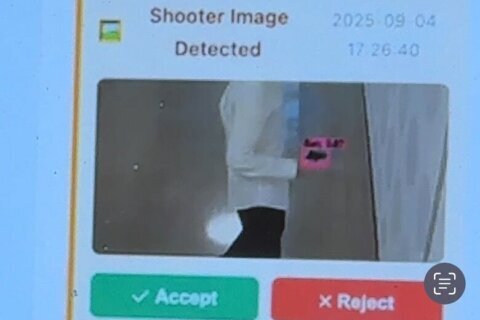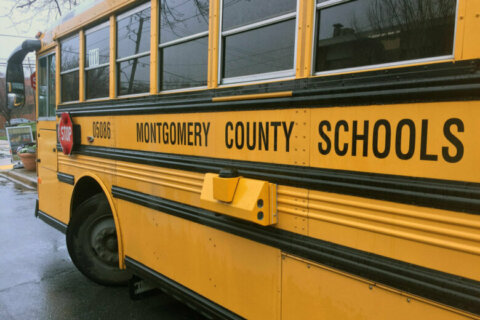Tuesday, Feb. 7 is #WearOrangeday, an effort to show solidarity with victims of teen dating violence and to raise awareness about the topic. Montgomery County, Maryland, is joining in with resources for families and teens alike.
The numbers are jarring: One in three adolescents is experiencing some kind of dating violence. That’s according to statistics provided by Choose Respect Montgomery, an initiative of the Montgomery County Domestic Violence Coordinating Council.
Debbie Feinstein, chief of the Special Victims Division with the Montgomery County State’s Attorney’s Office, said if a group of teens are gathered, “Statistically one or two of those friends may be impacted in some fashion or form by dating abuse.”
Make sure you wear orange tomorrow for Teen Dating Violence Awareness Month! #tdvam23 @mcps pic.twitter.com/6wz4paf21c
— Choose Respect (@Choose_Respect) February 6, 2023
Signs of abuse
Feinstein says many times, teenagers pick up on signs of violence in a friend’s relationship. The initial change may have nothing to do with a violent act, but with changes in the victim’s relationships with friends and family. One signal: The victim withdraws from favorite school activities and their group of friends.
“Suddenly they’re changing what they’re doing, and they’re spending all their time with their dating partner,” Feinstein said. The victim of dating violence or abuse may also give their location data to a partner, who may demand to verify the victim’s location any time day or night. Weight changes or other changes in physical appearance may also signal abuse in a relationship, Feinstein said.
While social media might extend the reach of the abuser in a teen relationship, with 24/7 access to their victim, abuse within dating relationships — even among teens — “has been pervasive long before social media,” Feinstein said.
While it’s more common to find girls being abused by boys in a teen dating relationship, boys are also victims of abuse, Feinstein said. She mentioned a study showing that “small acts of physical violence,” such as pinching, hitting and pulling hair, are also committed by girls against their male dating partners.
How to get help
Feinstein said it’s not uncommon for victims of dating abuse to go to a “trusted adult.” That can include teachers, coaches or counselors at school.
“We really encourage that as a part of our Choose Respect curriculum,” Feinstein said, referring to her office’s partnership with Montgomery County Public Schools. “We’re able to, if the teen wants, to get them connected to services.”
Feinstein encourages teens to go to the Family Justice Center, either by going to its website or heading directly to its offices in Rockville.
“It’s an incredible, free resource,” Feinstein said of the center, which can direct students to a variety of helpful services. “They can even call anonymously and speak to someone.”
Friends or family may want to step in, but Feinstein said they’ll want to avoid taking a judgmental tone. Instead, she suggests telling the victims that they respect and care about them, and they are really worried. Offering to accompany the victim to get help is constructive, as is emphasizing that the person deserves a healthy relationship.
Donna Rojas, the chair of the Montgomery County Commission for Women, agrees that a big part of helping people in abusive relationships — adults or teens — is to avoid shaming or blaming the victim. Making them feel comfortable about sharing what they’re going through is important, Rojas said, “Because our teenagers keep things to themselves.”
Activities
Rojas suggested activities where the focus is on something other than the conversation. Maybe a lunch or dinner, where, if the teen feels like sharing what’s going on, the parent could provide a sympathetic ear before offering resources for help.
Choose Respect Montgomery is holding an ongoing contest with teens encouraged to create their own one minute public service announcement on how to stop dating abuse. They can enter their PSA in a contest with a top prize of $1,000.
Enter our Choose Respect Video Contest and earn 10 SSL hours and a chance at $1,000! Deadline is March 13th! https://t.co/703jPqQm8u #tdvam23 #beaboutit @MCPS @MontgomeryCoMD pic.twitter.com/4rwsgrhdFU
— Choose Respect (@Choose_Respect) February 1, 2023
“Really the idea is that they’re creating it and learning about the topic,” while at the same time sharing what they’ve learned with the public, Feinstein said.
On April 16, the Choose Respect program will feature an afternoon program called “Respect Fest” at the Wheaton Community Recreation Center, featuring education on the topic and activities, such as yoga and self- defense, as well as giveaways, music and food.
Rojas said the event provides parents and teens with ways to learn and talk about what healthy relationships look like and how to identify abuse. “Parental involvement is huge,” Rojas said.
Learn more about asking for help in the video below.








